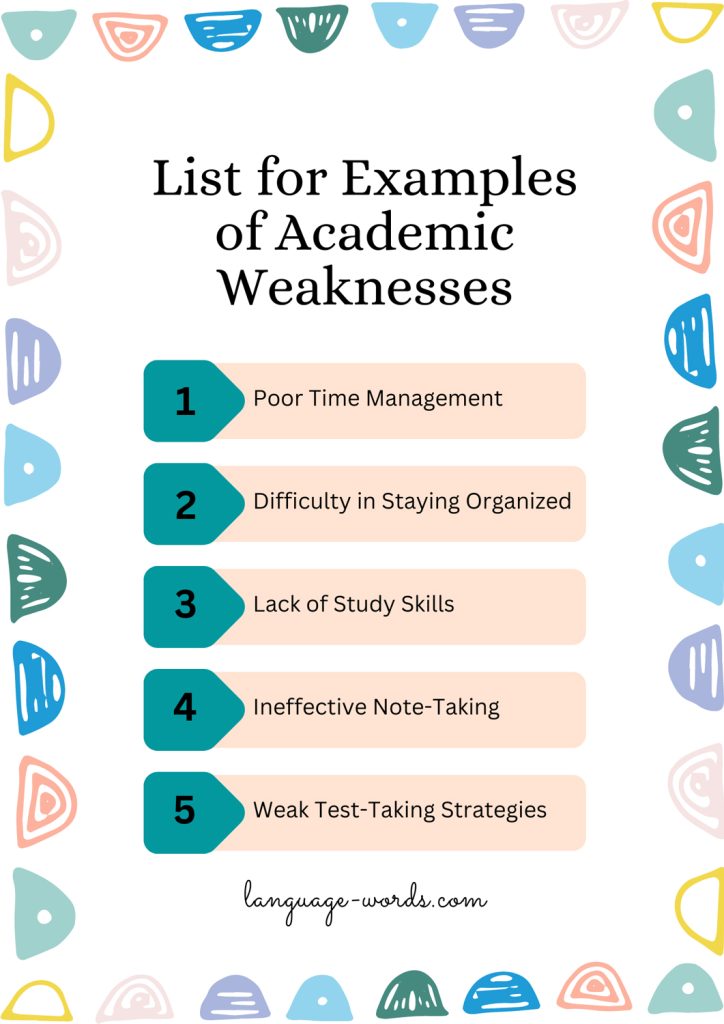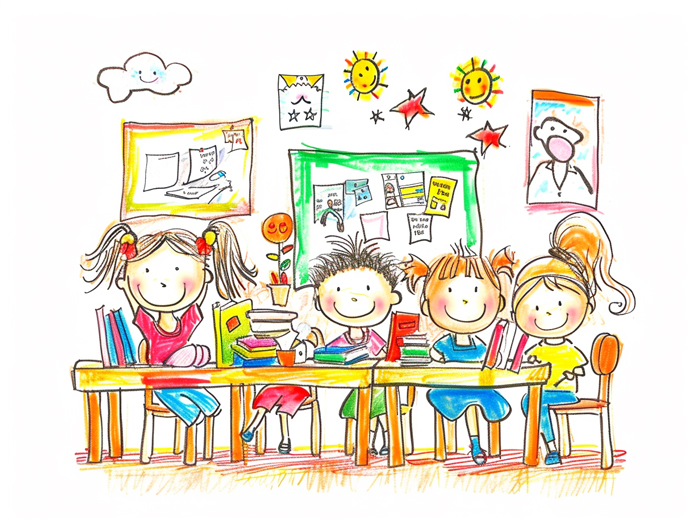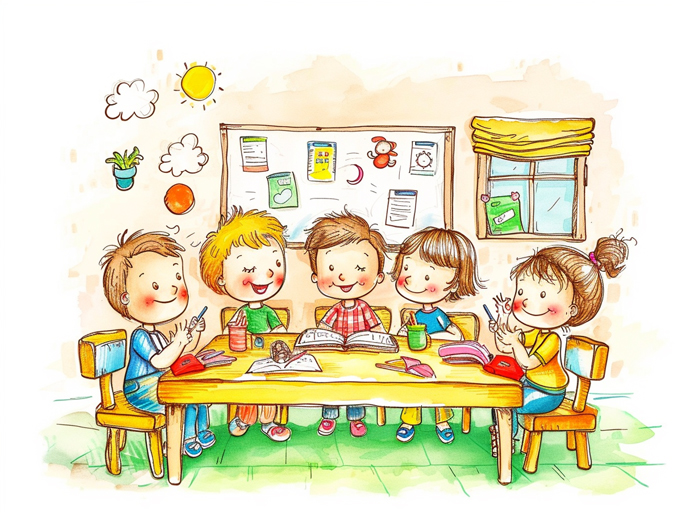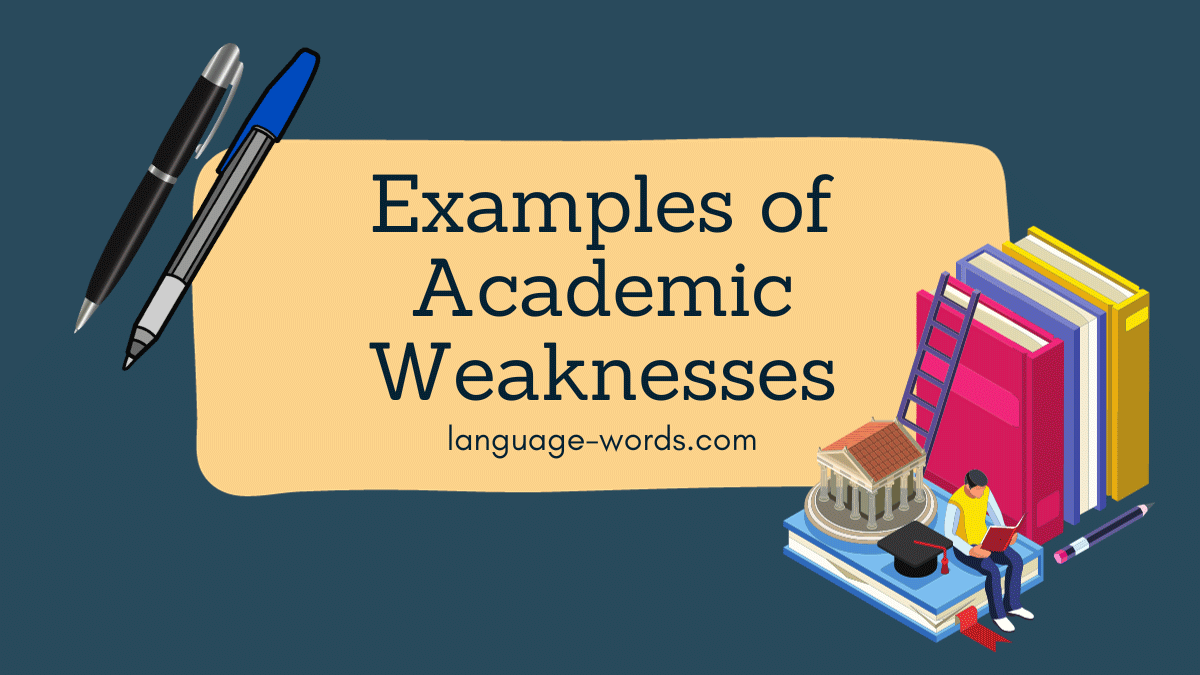As a student, it’s important to recognize and address our academic weaknesses in order to improve and excel in our studies. In this article, I’ll be discussing some common examples of academic weaknesses that students often face. By understanding these weaknesses, you’ll be better equipped to overcome them and achieve your academic goals.
One common academic weakness is poor time management. Many students struggle with balancing their academic responsibilities with extracurricular activities and personal commitments. This can lead to procrastination, missed deadlines, and a lack of focus. In this article, I’ll provide practical tips and strategies to help you effectively manage your time and make the most of your study sessions.
Another common academic weakness is difficulty in staying organized. From misplaced assignments to cluttered study spaces, disorganization can hinder your ability to stay on top of your coursework. I’ll share some practical techniques for organizing your study materials, creating a study schedule, and maintaining a productive learning environment. By implementing these strategies, you’ll be able to enhance your productivity and reduce stress.
Join me as we delve into these examples of academic weaknesses and explore effective solutions to overcome them. By addressing these weaknesses head-on, you’ll be on your way to becoming a more successful and confident student.
Definition List For Examples of academic weaknesses
As an experienced blogger, I have encountered numerous examples of academic weaknesses that students often face. In this section, I will provide a definition list of these common weaknesses to help you understand them better. Let’s dive in:

1. Poor Time Management
One of the most prevalent academic weaknesses is poor time management. When students struggle with managing their time effectively, it can lead to procrastination and missed deadlines. This often results in added stress and a decrease in overall productivity.
2. Difficulty in Staying Organized
Another common weakness that students face is difficulty in staying organized. Without proper organization, coursework can become overwhelming, leading to missed assignments and a lack of focus. Staying organized is essential for success in academics.

3. Lack of Study Skills
Some students struggle with developing effective study skills. This weakness can hinder their ability to comprehend and retain information. Without the right study techniques, students may find it challenging to perform well on exams and assignments.
4. Ineffective Note-Taking
Taking effective notes is crucial for academic success. However, many students struggle with this skill. Poor note-taking can lead to confusion and difficulty in understanding key concepts during study sessions and lectures.
5. Weak Test-Taking Strategies
Test-taking can be a source of anxiety for many students, particularly if they lack strong test-taking strategies. Without proper techniques, students may struggle to manage their time, interpret questions accurately, and provide well-structured answers.
Understanding Academic Weaknesses
As an experienced educator, I have come across various academic weaknesses that students often face. These weaknesses can hamper their academic success and hinder their overall growth. In this section, I will shed light on some common examples of academic weaknesses, highlighting their impact and importance in addressing them.

Poor Time Management
One of the most prevalent academic weaknesses is poor time management. Many students struggle with effectively managing their time, often leading to procrastination and incomplete assignments. Without a proper schedule and time management skills, students may find it challenging to meet deadlines and stay on top of their coursework.
Difficulty in Staying Organized
Another common academic weakness is difficulty in staying organized. Students who lack organizational skills may have trouble keeping track of their assignments, notes, and study materials. This can result in misplaced work, missed deadlines, and added stress. Being organized plays a crucial role in staying focused and completing tasks efficiently.
Lack of Study Skills
Effective study skills are vital for academic success. However, some students may lack the necessary skills to study effectively. This weakness can manifest as difficulty in retaining information, poor note-taking, or inefficient study techniques. Developing and honing study skills can significantly enhance a student’s ability to comprehend and retain knowledge.
Ineffective Note-taking
Taking effective notes is a crucial skill that many students struggle with. Ineffective note-taking can lead to difficulties in recalling important information during exams or while writing assignments. Students with this weakness may need guidance on note-taking strategies and techniques to improve their comprehension and retention of key concepts.
Weak Test-taking Strategies
Lastly, weak test-taking strategies can inhibit a student’s ability to perform well in exams. Some students may struggle with managing their time during exams, experiencing test anxiety, or being unable to effectively answer different types of questions. Understanding and implementing effective test-taking strategies can boost a student’s confidence, reduce stress, and improve their performance.
Addressing these academic weaknesses is essential for students to maximize their potential and achieve academic success. By identifying and acknowledging these weaknesses, educators and students can work together to implement strategies and interventions that will support their growth and progress.
Remember, recognizing and addressing academic weaknesses does not imply failure. Instead, it is a proactive approach to self-improvement and setting oneself up for success.
Common Academic Weaknesses

Procrastination
Procrastination is a common academic weakness that many students struggle with. It refers to the act of delaying or postponing tasks, often resulting in rushed or incomplete work. As a student, I understand how easy it can be to fall into the trap of procrastination. In fact, research shows that approximately 80-95% of college students engage in procrastination to some degree.
But why do students procrastinate? There can be various reasons. Sometimes, it’s due to a lack of motivation or interest in the task at hand. Other times, it’s the fear of failure or the overwhelming feeling of being overwhelmed by the workload. However, procrastination can have detrimental effects on academic performance. It can lead to last-minute cramming, increased stress levels, and a lower quality of work.
Lack of Organization
Another common academic weakness is a lack of organization. Without proper organization, it can be challenging to keep track of assignments, due dates, and study materials. I’ve experienced this firsthand and let me tell you, it’s not a pleasant feeling. Research shows that effective organization skills are associated with higher academic achievement.
Students who struggle with organization may find themselves misplacing important papers, forgetting deadlines, and feeling overwhelmed by clutter. This can lead to missed assignments, late submissions, and poor time management. A study conducted in 2019 found that students who are well-organized are more likely to complete their assignments on time and achieve higher grades.
To address this weakness, I’ve found several strategies that have helped me improve my organizational skills:
- Creating a schedule or planner to keep track of assignments and due dates
- Setting reminders or alarms to stay on top of deadlines
- Using folders or binders to keep study materials organized
- Implementing a filing system for important papers and documents
By practicing these techniques, students can make significant improvements in their organizational skills and ultimately enhance their academic success.
Remember, addressing these common academic weaknesses, like procrastination and lack of organization, is essential for students to maximize their potential and achieve academic success. Stay tuned as we explore more examples of academic weaknesses and strategies for improvement in the next section.
Specific Academic Weaknesses

Difficulty in Time Management
When it comes to academic success, effective time management is crucial. Students who struggle with time management often find themselves rushing to complete assignments, studying at the last minute, and overall feeling overwhelmed and stressed. This weakness can have a negative impact on their performance and grades.
To address difficulty in time management, it is important to:
- Create a schedule or planner to prioritize tasks and allocate time for each one.
- Set reminders or alarms to keep track of deadlines and important dates.
- Break down larger tasks into smaller, manageable chunks to avoid feeling overwhelmed.
- Practice self-discipline and avoid distractions, such as social media or excessive screen time.
By implementing these strategies, students can improve their time management skills and ultimately enhance their academic performance.
Poor Note-taking Skills
Taking effective and organized notes is a skill that can greatly enhance the learning experience. Students with poor note-taking skills often struggle to capture important information during lectures or while reading, which can lead to difficulty understanding concepts and studying effectively.
To improve note-taking skills, consider the following tips:
- Pay close attention during lectures and actively engage with the material.
- Use abbreviations and symbols to speed up the note-taking process.
- Organize notes using headings, bullet points, and sub-points.
- Review and revise notes regularly to reinforce understanding and improve retention.
By developing strong note-taking skills, students can better understand and remember key information, aiding them in their studies and overall academic success.
Lack of Critical Thinking Abilities
Critical thinking is a fundamental skill that allows students to analyze information, evaluate arguments, and make informed decisions. Students who struggle with critical thinking may have difficulty interpreting and synthesizing information, resulting in less effective problem-solving and decision-making abilities.
To cultivate critical thinking abilities, it is important to:
- Encourage students to question and critically evaluate information they encounter.
- Teach strategies for analyzing and interpreting data or arguments.
- Foster opportunities for open-ended discussions and debates.
- Provide real-world examples and scenarios to practice critical thinking skills.
By honing their critical thinking abilities, students can become better problem solvers, independent thinkers, and active learners.
Addressing specific academic weaknesses such as difficulty in time management, poor note-taking skills, and lack of critical thinking abilities is vital for students to maximize their academic potential. By implementing effective strategies and developing these skills, students can enhance their overall academic performance and achieve success in their educational journey.
Impact of Academic Weaknesses

Lower Grades
Academic weaknesses can have a significant impact on a student’s grades. When students struggle with time management, poor note-taking skills, or lack critical thinking abilities, their academic performance may suffer. Difficulties in managing time effectively can lead to missed deadlines and incomplete assignments, resulting in lower grades. Poor note-taking skills can make it challenging for students to review and understand the material covered in class, leading to a lack of comprehension and lower test scores. Additionally, the inability to think critically can hinder a student’s ability to analyze information and provide well-supported arguments, further impacting their overall grades.
Increased Stress and Anxiety
The presence of academic weaknesses can also contribute to increased levels of stress and anxiety among students. When students struggle to manage their time or complete tasks, they may experience heightened levels of pressure as deadlines approach. These added stressors can make it difficult for students to focus and concentrate on their studies, leading to feelings of overwhelm and anxiety. Additionally, poor note-taking skills and a lack of critical thinking abilities can make it harder for students to feel confident and prepared for tests and assignments, adding to their stress levels. The cumulative effect of these academic weaknesses can have a detrimental impact on a student’s mental and emotional well-being.
By addressing these academic weaknesses, students can mitigate the negative impact they have on their grades and overall well-being. Implementing strategies such as creating a schedule, improving note-taking skills, and practicing critical thinking can help students to better manage their time, comprehend course material, and perform at their best academically. Taking steps to address these weaknesses can lead to improved grades, reduced stress, and enhanced overall academic success.
It’s essential for educators and parents to recognize and support students in overcoming their academic weaknesses. By providing the necessary guidance and resources, students can develop the skills and strategies they need to excel academically and thrive in their educational journey.
Remember, addressing academic weaknesses is crucial for students to maximize their potential and achieve success in their educational pursuits. By implementing strategies and providing support, we can help students excel and reach their academic goals.
Strategies to Overcome Academic Weaknesses

Setting Clear Goals
When it comes to overcoming academic weaknesses, setting clear goals is crucial. Having a clear direction helps me stay focused and motivated. By setting realistic and achievable goals, I can better manage my time and prioritize my tasks. Here are a few steps I take to set clear goals:
- Identify your weaknesses: Start by identifying the specific areas where you struggle academically. Is it time management, note-taking, or critical thinking? By pinpointing these weaknesses, you can create targeted goals for improvement.
- Break down your goals: Once you know the areas you want to improve, break down your goals into smaller, more manageable tasks. This will make them less overwhelming and easier to tackle.
- Set deadlines: Assign deadlines to your goals and tasks. This will create a sense of urgency and help you stay accountable.
Developing Effective Study Habits
Developing effective study habits can significantly improve your academic performance. Here are some study habits that have worked well for me:
- Create a study schedule: Having a study schedule helps me stay organized and ensures that I allocate dedicated time for each subject. It also helps in avoiding procrastination.
- Use active learning techniques: Instead of passively reading or listening, engage in active learning techniques, such as summarizing information in your own words or teaching someone else. This helps in better understanding and retention of the material.
- Break down your studying: Instead of cramming for hours, break down your study sessions into shorter, focused intervals. This improves concentration and prevents burnout.
Seeking Help and Support
It’s important to remember that seeking help and support is not a sign of weakness, but rather a smart strategy for overcoming academic challenges. Here’s how I seek help when needed:
- Approach teachers or professors: If you’re struggling with a particular subject or concept, don’t hesitate to reach out to your teachers or professors. They are there to help and can provide valuable guidance and clarification.
- Form study groups: Collaborating with peers in study groups can be beneficial, as you can learn from each other, share different perspectives, and support one another.
- Utilize academic resources: Take advantage of academic resources such as tutoring services, writing centers, or online resources specific to your subject. These resources can provide additional support and guidance.
By implementing these strategies, I have been able to overcome my academic weaknesses and improve my overall performance. Remember, overcoming academic weaknesses is an ongoing process, and it’s important to be patient and persistent. With the right strategies and support, you can achieve academic success.
Conclusion
In this article, I have discussed various strategies for overcoming academic weaknesses. By setting clear goals, breaking them down into manageable tasks, and setting deadlines, students can effectively tackle their weaknesses. Developing effective study habits, such as creating a study schedule and using active learning techniques, can also greatly enhance academic performance. Seeking help and support from teachers, tutors, or classmates is another smart strategy for overcoming challenges. However, it is important to remember that overcoming academic weaknesses takes time and patience. It requires persistence and a willingness to learn from mistakes. By implementing these strategies and staying committed to personal growth, students can overcome their academic weaknesses and achieve success in their studies. Remember, it’s not about being perfect, but about continuously striving to improve.

